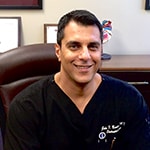What is a Cardiac Ultrasound?
A cardiac ultrasound, also called an echocardiogram or echo, is a test that takes pictures of the heart. During the cardiac ultrasound, harmless sound waves are delivered to the heart through a probe that is passed over the chest. The sound waves will bounce off the heart, returning to the probe to create a picture of the chambers, walls of the heart, heart valves, and blood vessels, giving a complete view.
Why is a Cardiac Ultrasound Done?
A cardiac ultrasound is a diagnostic tool that can be used to examine the structure of the heart to see its overall size and shape and how large or narrow the heart valves are. With a cardiac ultrasound, Dr. Beshai can detect signs of a tumor or other growth on the heart’s structure. During the cardiac ultrasound, the movement and function of the heart can also be observed. This shows Dr. Beshai how well the heart valves are working and the pumping strength of the heart.
When is a Cardiac Ultrasound Needed?
Dr. Beshai might recommend a cardiac ultrasound if you experience one of the following cardiac conditions or symptoms:
- A heart murmur
- History of heart attack
- An irregular heartbeat (arrhythmia)
- Problems with the heart muscle (cardiomyopathy)
- Chronic heart disease
- Congestive heart problems
A cardiac ultrasound can report on the progression of a heart condition, how well treatment is working or can help to rule out other heart conditions and abnormalities.
Have Inquiries About Our Services?
How is a Cardiac Ultrasound Performed?
During a cardiac ultrasound, you will be asked to lie on a table and our ultrasound technician will place ECG sensors on your chest. An ECG measures the activity of the heart and the electrical waves that signal for the heart to beat. Gel will then be placed on the chest to help the ultrasound waves pass through your skin. You may be asked to breathe or hold your breath briefly to allow the technician to get an accurate picture of the heart. The probe will be moved across your chest to create the picture, which is then displayed on a video monitor. The video of the ultrasound is recorded for Dr. Beshai to view and analyze.
What are the Next Steps After a Cardiac Ultrasound?
After your cardiac ultrasound, Dr. Beshai will go over your ultrasound images with you and point out anything he found. If the results came back normal, Dr. Beshai can rule out certain conditions and you may not need further testing. Depending on any abnormalities that were discovered, Dr. Beshai can get a better diagnosis and begin developing the right treatment plan for you.
Schedule Your Cardiac Ultrasound Appointment
Dr. Beshai uses cardiac ultrasound imaging as an important diagnostic test that can detect abnormalities in the heart’s structure and where they’re coming from. When it comes to the heart, early screening and monitoring is essential, even if symptoms have not occurred yet. If you think you could benefit from a cardiac ultrasound or other heart testing, contact our office to meet with Dr. Beshai, an experienced cardiac electrophysiologist, by calling our office or filling out our online form.
The Heart Institute of Arizona has a wide array of services that come with our premium care. From in-office dianostics and treatable conditions, to hospital based procedures, we’ve got your heart covered.
Dr. Beshai is a board-certified electrophysiologist internationally renowned and respected for his expertise and research. Having published in major medical journals and travelled all over the world to present research, he is dedicated to providing innovative, state-of-the-art care to his patients.
- John F. Beshai, MDhttps://heartbeataz.com/author/heartbeata/
- John F. Beshai, MDhttps://heartbeataz.com/author/heartbeata/
- John F. Beshai, MDhttps://heartbeataz.com/author/heartbeata/
- John F. Beshai, MDhttps://heartbeataz.com/author/heartbeata/

